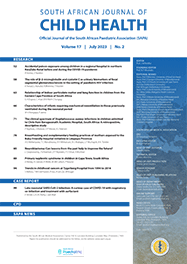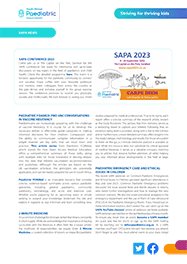Research

Audiological findings in a group of neurologically compromised children: A retrospective study
Abstract
Background. Hearing loss is more prevalent in developing countries. Later diagnosis of hearing loss will result in delayed access to rehabilitation. It is typically more difficult to obtain subjective information required in a hearing test from neurocompromised children, causing audiologists to frequently turn to objective measures such as the auditory brainstem response (ABR) measure to obtain this information.
Objective. To describe the ABR results in a group of neurologically compromised children and to establish a relationship between ABR findings and behavioural audiometry results, where these existed.
Methods. A retrospective review was conducted on 40 ABR patient records of neurologically compromised participants aged 5 months - 10 years. Behavioural audiometry results were sought where these existed. Hearing status was described per ear for objective and behavioural results, and descriptive statistics were conducted.
Results. Behavioural audiometry results were obtained in 72.5% of ears. Results correlated between ABR and behavioural audiometry for only 7.5% of ears, which were all diagnosed with normal hearing. About12.5% of ears were misdiagnosed with behavioural audiometry. Premature infants were most likely to cope with behavioural audiometry. Hearing loss was highest in participants with cerebral palsy, Down syndrome, prematurity and retroviral disease.
Conclusions. Behavioural audiometry appears to be a largely unreliable method of testing the hearing of children diagnosed with neurological disorders, as results were obtained in only 27.5% of the study sample; however, it remains the gold standard in paediatric hearing testing to evaluate the entire auditory system and provides information on how a child processes sound. Hearing thresholds should be established via objective testing. Conditioning should continue for a behavioural audiological test battery, with adaptations for the child’s developmental ability.
Authors' affiliations
Katijah Khoza-Shangase, Department of Speech Pathology and Audiology, Faculty of Humanities, School of Human and Community Development, University of the Witwatersrand, Johannesburg
Lorna Jacklin, Department of Paediatrics, Faculty of Health Sciences, University of the Witwatersrand, Johannesburg
Full Text
Keywords
Cite this article
Article History
Date published: 2016-03-29
Article Views
Full text views: 1462

.jpg)



Comments on this article
*Read our policy for posting comments here